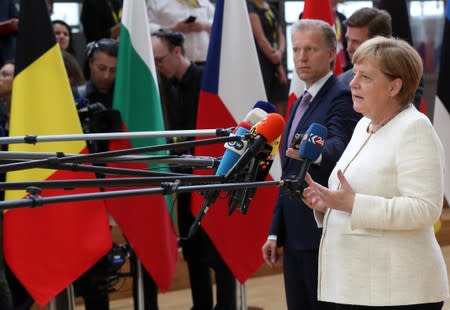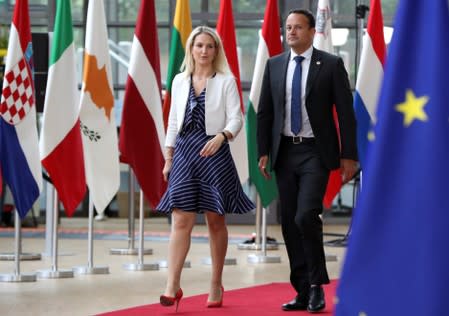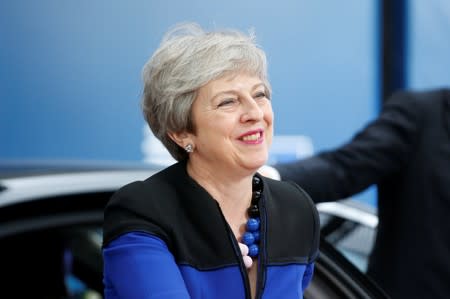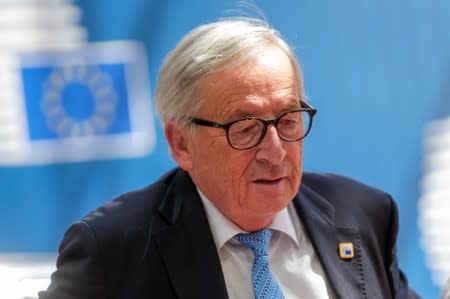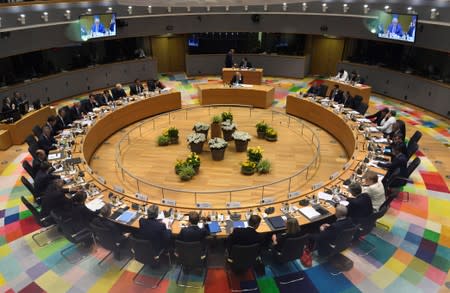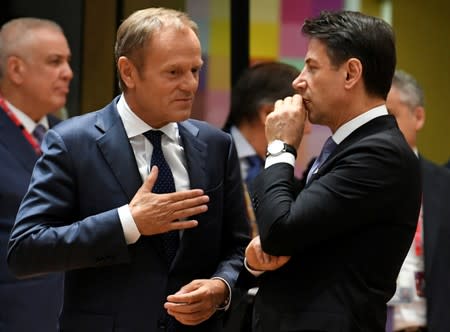Divided EU leaders set sorting out euro zone budget financing as priority
By Jan Strupczewski
BRUSSELS (Reuters) - European Union leaders told their finance ministers on Friday to sort out the sources of financing for a future euro zone budget as a matter of priority, but remained vague on the idea of a European bank deposit insurance scheme.
The chairman of euro zone finance ministers, Mario Centeno, briefed the leaders on what ministers have achieved since they were asked last December to work on creating a euro zone budget along with other reforms, including the deposit guarantee scheme known as EDIS.
The ministers were to have worked out how a budget for the 19 countries sharing the euro currency could be financed, what it should be used for and how it would be managed, with the final size to be determined by the leaders.
But progress has been limited because of widely differing views. France and several southern European countries want a large budget funded by dedicated taxes and able to stabilise economies hit by an unexpected shock.
The Netherlands and its northern European allies want a small budget funded only from the existing, wider EU budget and used for investment or to support structural reforms.
"We ask the Eurogroup and the Commission to further work on all pending issues," the leaders said in a statement without setting any deadline for the conclusion of the talks.
"We ask the Eurogroup to report back swiftly on the appropriate solutions for financing," they said about the euro zone budget, called the Budgetary Instrument for Competitiveness and Convergence (BICC).
"These elements should be agreed as a matter of priority so as to be able to set the size of the BICC in the context of the next Multi-annual Financial Framework," they said, referring to the wider EU's next long-term budget.
The EU has to agree on a new long-term budget before the end of next year, before the current one ends in December 2020.
EDIS, ESM
Leaders took note of progress made by finance ministers last week on the reform of the bloc's rescue fund, the European Stability Mechanism, which would increase its monitoring powers over countries with economic imbalances and also facilitate the restructuring of governments' debts in crises.
Leaders avoided instead a direct reference to the deposit scheme, which has been stalled for years because of strong opposition from Germany.
Italian Prime Minister Giuseppe Conte said no progress could happen on the ESM reform and the euro zone budget if the deposit guarantee scheme was not agreed too, in a potential blow to the whole reform process.
The leaders' statement said only that the leaders "look forward to the continuation of the technical work on the further strengthening of the Banking Union" -- EU code for the scheme -- in a sign there was no deadline for the discussions.
Germany and some northern European countries are reluctant to commit to a joint scheme to insure euro zone deposits before banks in southern countries such as Italy, Greece or Portugal have substantially reduced their bad loans -- a legacy of the sovereign debt crisis of 2010-2015.
An insurance scheme would make depositors across the euro zone feel safe and prevent bank runs in the event of a crisis. It would complete the banking union, which already has a single bank supervisor and a resolution authority.
German resistance has so far blocked any progress even on a timetable for introduction of a deposit guarantee scheme. A high-level working group of senior euro zone officials is to continue discussing the matter and report back to finance ministers in December.
(Reporting by Jan Strupczewski; additional reporting by Francesco Guarascio; Editing by Catherine Evans)
